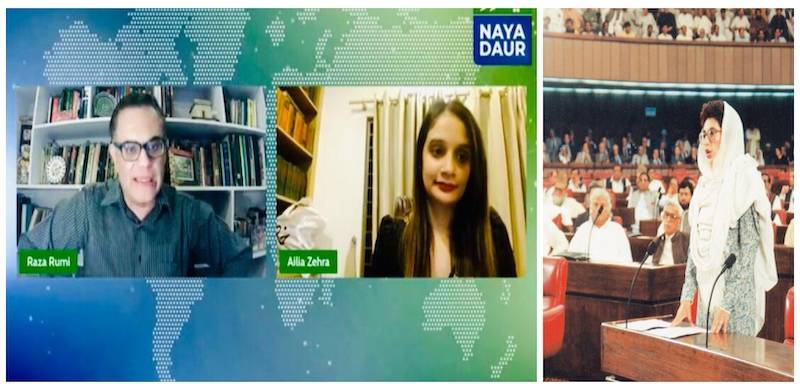
Awam Ki Baat. Naya Daur TV. March 5, 2021.
https://www.youtube.com/watch?v=mGj1b6ENp3o
Raza Rumi talks about gender gap in institutions and importance of bringing up women in all walks of life.
There are many issues in media including the gender gap; lack of diversity not only in terms of gender but areas of coverage as well. Media focuses primarily on urban areas because of their potential to attract advertisements, while rural and far flung regions are ignored. Balochistan, formerly FATA, South Punjab and villages don’t make it to headlines and news content.
As far as gender disparity is concerned, women journalists face several hurdles to excel and have to exert extra effort to prove themselves. In media houses, women journalists are highly under represented. Similar is the case in press clubs. Part of the issue lies in the biased attitude towards women i.e. presuppositions on their capacity and capability; ‘she won’t be able to travel at night’, ‘she has kids, how will she do the job’, etc. Similar attitude is visible in Police and courts. For instance, if a woman is raped, she is blamed; her clothes or time of going out is termed as a cause. Earthquake and coronavirus have been attributed to under clothing of women by religious figures like Tariq Jameel.
The issue is, therefore, institutional and there is a need for unlearning these biases.
Society has ascribed roles based on gender. Those who speak of Natural justice justify these stereotypes as a natural law that roles of man and woman are pre ordained. Segregating them is thus a natural imperative. They use the terms like rape casually to describe how bad is the state of affairs, corruption, performance of institutions, etc. To them, outside is man’s world while home making is woman’s.
For debates on women rights, mainstream media invites these people whose opinions lie on extreme ends. It isn’t, and doesn’t have to be necessarily a clash of idea, i.e. women rights. A middle, balanced approach should be encouraged.
While we can talk of the role parliament can play to mitigate these biases, in sphere of politics, we have seen misogyny at full display. Fatima Jinnah was discouraged because of her gender, even though she was man enough to confront the dictator. And then Benazir Bhutto is a case in point who fought with the dictator. Religious figures put unending labels on her and undermined her repeatedly. Her gender was well exploited by the opposition at the time. They shadowed doubts on her capability to lead and Asif Zardari was not spared either due to his affiliation with BB. From the start, he was labelled dacoit and thief as someone rising on shoulders of a woman. It was even said that he abused BB and had married another. Subsequently, he served over 11 years in jail. It does not mean that he was totally innocent but his affiliation with BB was exploited well.
In fact, when BB died, the same people took little to no time in blaming Asif Zardari.
Politics has been a no-entry zone for women. But we can see how much work the women Parliamentarians did. Pakistan pioneered in passing laws on sexual harassment and honour killing. Despite that, it is often portrayed that the incoming women belong to rich families. Their personalities come under attack and performance is ignored. Nafeesa Shah, Sheren Mazari, Maryam Aurengzeb and Sherry Rehman etc. have done extensive works for women, more than their male counterparts. You will never see them use abusive language and fight like male Parliamentarians did in Sindh assembly quite recently. Other than parliament, we witness how a woman judge wiped out an incompatible law, two finger test, with a stroke of a pen. There is a need for greater representation of women in judiciary. The apex court is male dominated and women should be bright up on equal footings. Women have proved that they are more capable than their male colleagues. What is stopping them are the gender stereotypes. Media should play its role actively and call out these stereotypes and highlight the contributions of women in different fields.
It should bring into limelight the productive performance of women to discredit the narrative that women are not as capable as their male colleagues. Meanwhile, the government has a crucial role to play to formulate policies and laws that address these stereotypes.
